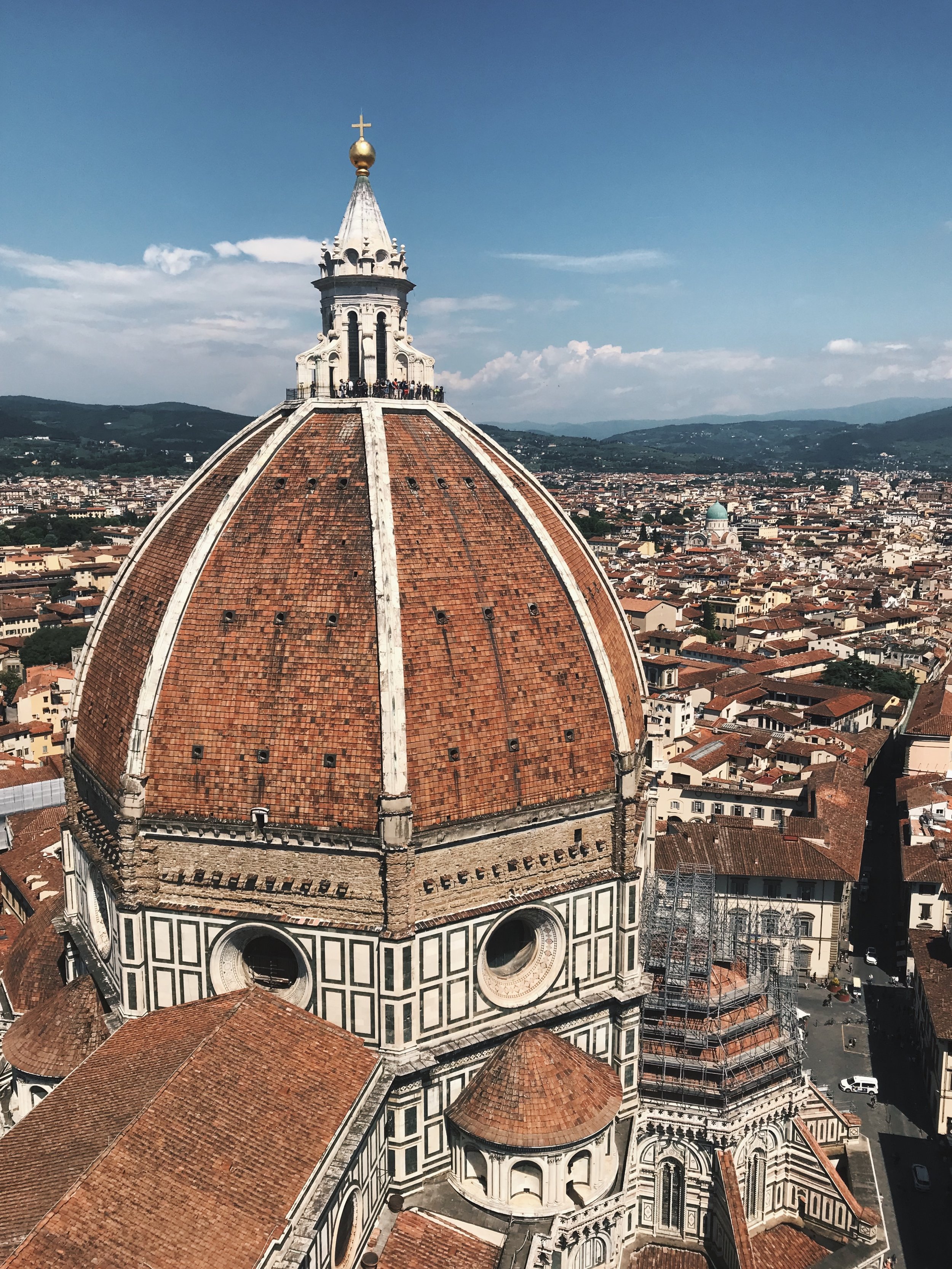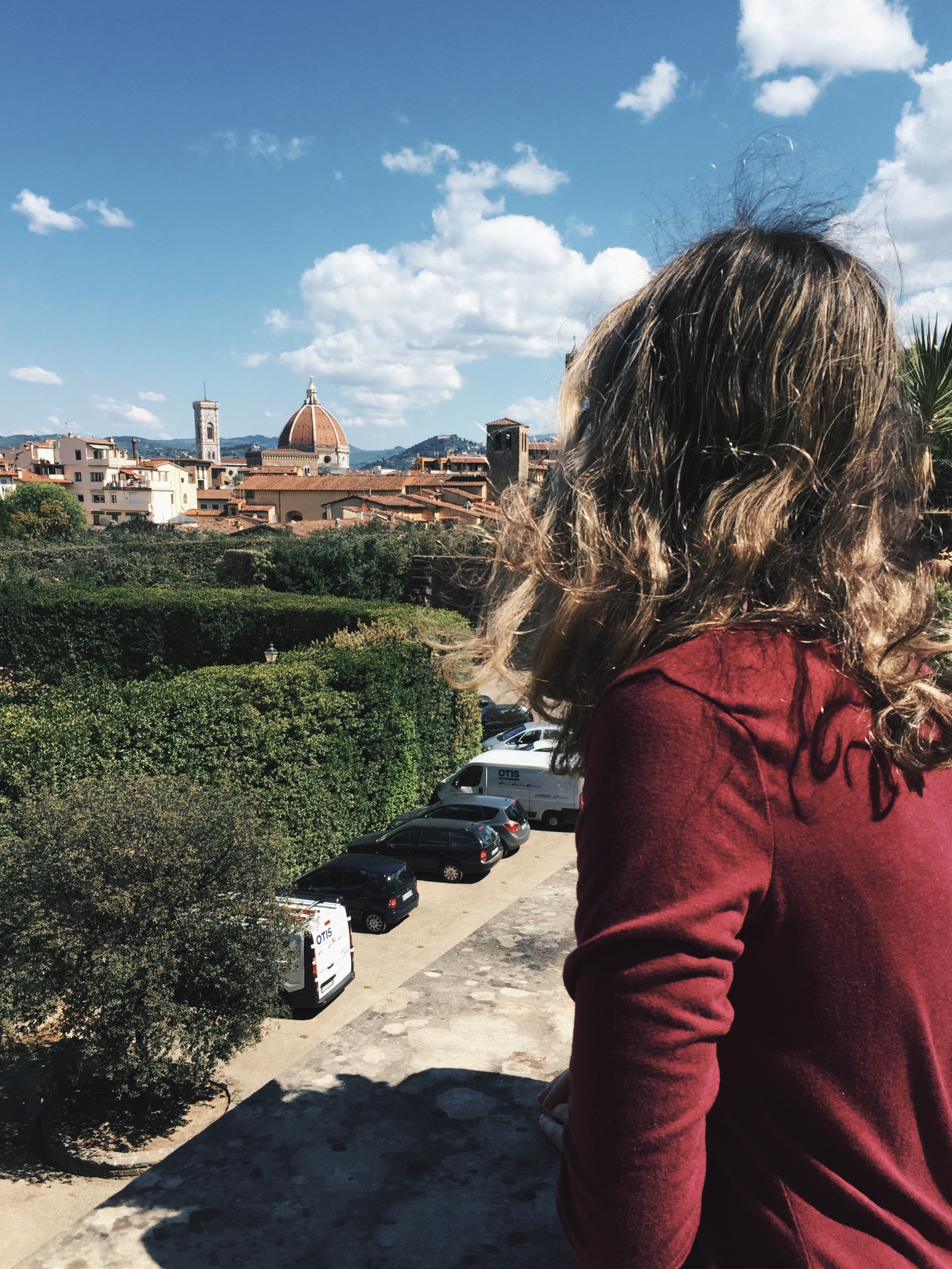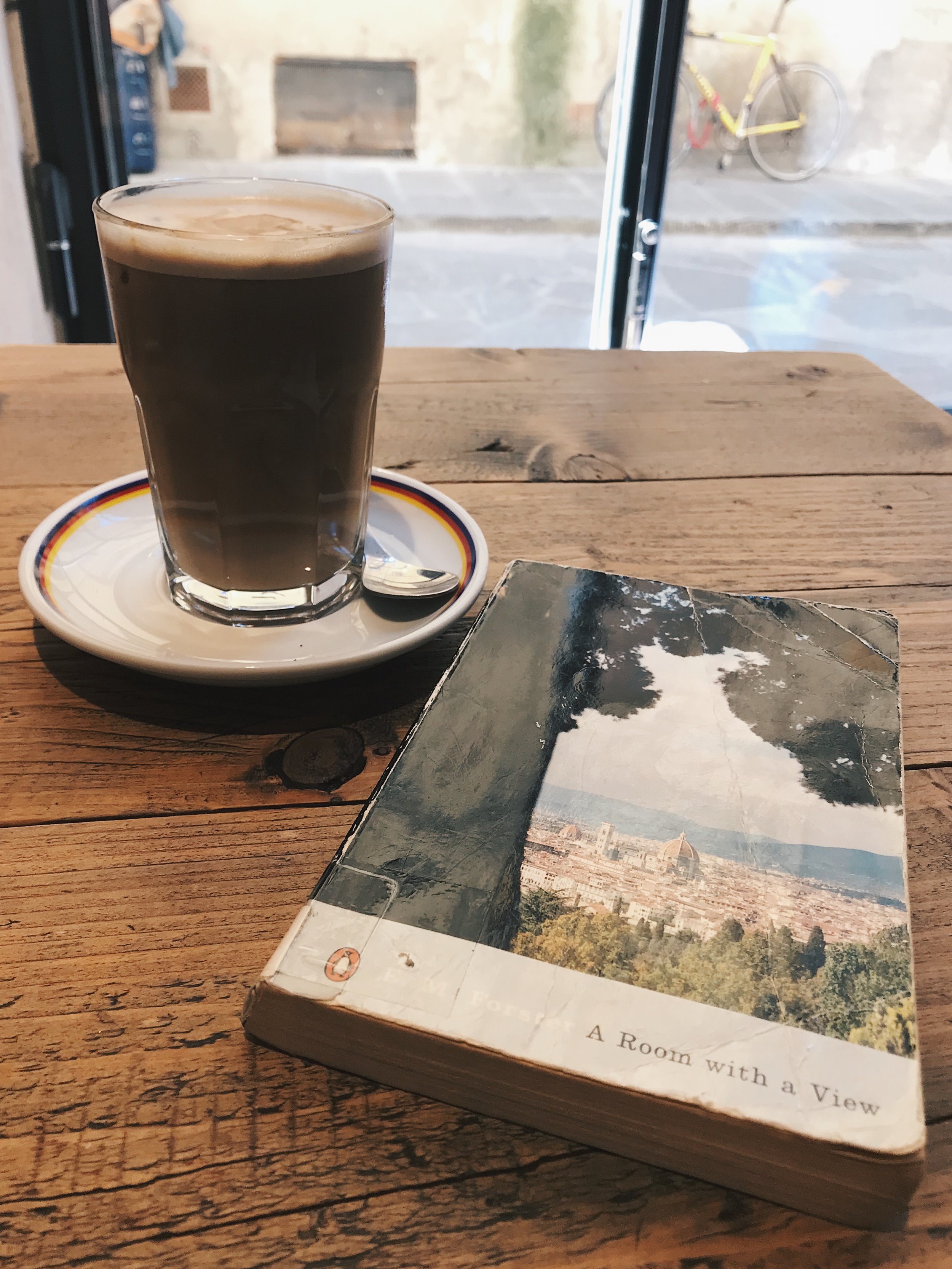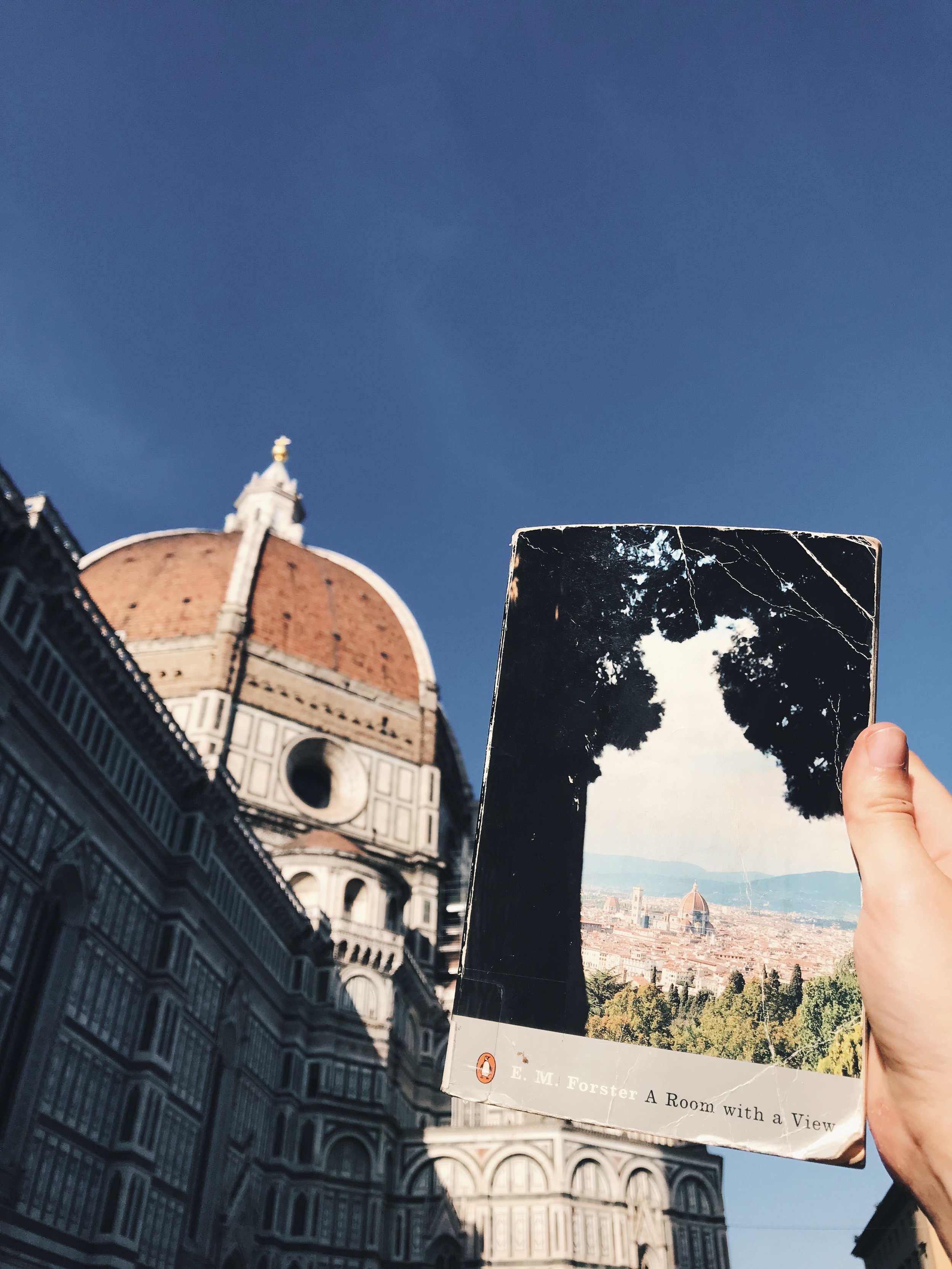Beautiful Things Are Worth Pursuing: Battling Homesickness with A Room with a View
The author in Florence.
Sometimes I really, really hate this country.
By “this country,” I mean Italy, my adopted home for the year as I pursue my master’s degree in Florence. By “hate,” I actually mean “love-hate,” as I am unsure that there is any place in the world that comes close to providing me with the feelings I have for Florence, while still making me feel that, sometimes, I would rather be anywhere else. Pushing through crowds of tourists. Walking a mile across the city in the sticky summer heat. Trying to find fresh iced tea at a number of cafes to no avail. All of these experiences infuriate me. But then I catch a glimpse of the Duomo, from a far distance, a Brunelleschian marvel of architecture that defines the city, and my soul feels a bit more at peace.
I first came to Florence as a junior in college, traveling to study art history abroad at a studio art school. From the first moment my plane landed and I saw the Duomo and Palazzo Vecchio lit up from a distance, I couldn’t believe that I was finally in the city I had dreamed of for years. I was homesick at first, and it took me a very long time to become comfortable with a new country, city, language, and culture, but all the same, I eventually did find a home in Florence. I was extremely lucky to make some wonderful friends that became family at my abroad institution, and my shock and awe when I first saw Michelangelo’s David has since led to my all-encompassing love for Renaissance art, and particularly that of the Florentine High Renaissance. That love led me back, less than two years later, to do a master’s degree in Florence at an American institution.
Grad school is extremely difficult, and doing a master’s degree abroad, even at an American university, is an entirely different thing altogether. It is very helpful to see the pieces that you are learning about in person, to have access to archives, museums, and world-class libraries, but it is also quite isolating to be so singularly focused on schoolwork in an accelerated program, while also, still dealing with occasional homesickness, cultural differences, and speaking a different language when outside of class. However, when things get tough, when I cannot focus on my schoolwork, when I feel so done with this country, I often think of E. M. Forster’s 1908 novel, A Room with a View, which I first read when I was 19 and originally put the idea in my head to study abroad in Florence.
This book, also turned into a 1985 film starring Helena Bonham Carter, is a story that still feels contemporary, even though it was written more than a century ago. The story follows a British teenager named Lucy Honeychurch who goes on a “Grand Tour” of sorts to see Europe with her much older cousin Charlotte as chaperone. While visiting Florence, they meet another British family, Mr. Emerson and his teenage son, George. As could perhaps be foreseen, Lucy and George hit it off and then kiss in a field of violets in the hills of Fiesole overlooking Florence, only for Charlotte to find out and quickly whisk Lucy away to prevent anything more from happening. What a surprise, then, to find out that Mr. Emerson and George move in down the street from Lucy and her family once they arrive back in England; and what a surprise to learn that Lucy is now engaged to someone else!
You can probably see the book’s ending coming from a mile away, but it’s not really the romance that interests me here – it’s the Florence chapters that most enthrall me, the descriptions of Florence and its tourists a hundred years ago that still feel awfully contemporary, the chapter about the Basilica of Santa Croce and its beautiful Giotto frescoes, but mostly the noticeable impact that Lucy’s sojourn in Florence has on her, her personality, and her outlook on life and love.
In the beginning of the book, when Lucy is walking in the historic center of Florence, she thinks, “The world…is certainly full of beautiful things, if only I could come across them.” This is, of course, incredibly ironic as Lucy thinks this while walking through the beautiful and historic center of the city to arrive in its civic center, the Piazza Signoria. Despite its irony, I often think of this quote as a call to keep my eyes open and to appreciate the beauty around me. Lucy was also a young expat in a strange culture; perhaps she didn’t have a thesis to write or presentations to prepare on various Renaissance paintings, but she is still confused about the world around her and cultural differences, much like I often am.
A Room with a View, Merchant Ivory Productions, 1985.
At the end of the book, Lucy winds back up in Florence, with her new husband George, on their honeymoon a year later. They finally have a “room with a view” at their hotel, which was originally denied to Lucy during her first visit to the city. This time around, Lucy is different: she has an altered perspective, a wider view of the world around her, the pleasure of love with a silly and philosophical young man, and an appreciation for the beautiful things around her. At the top of this list is the very city of Florence, which Lucy has willingly returned to and the place where she and George fell in love – and the very same city that I fell in love with myself, a century later.
In learning about the art history of the Renaissance, I have seen innumerable beautiful parts of Florence. I can tell you all about so many small, gorgeous details in the city: statues, plaques, abandoned or unfinished fifteenth-century buildings with obscure and fascinating histories. I know, both academically and through my own travels throughout the city, about all of the beauty available in Florence. That does not mean that I do not have days where I hate it, where I want to be home in America, with access to Starbucks lattes and flavored sparkling water and no tourists stopping right in the middle of my path when I am on my way home.
“The beautiful things are worth finding when life gets to be too much.”
I do, however, think of Lucy Honeychurch, her adventures, and her heroine’s journey. I think of how Forster’s A Room with a View changed my life forever – leading me to Florence as an undergraduate, then back again as a graduate student, providing me with the invaluable experience of living in a foreign country as a young adult. I think of Lucy’s assertion that beautiful things must surely exist in the world somewhere, and I truly believe that beautiful things are worth pursuing: either in the form of Renaissance art, modern art, monuments in Florence, down to spotting a cute little corgi in a major piazza, seeing a sweet family eating gelato from afar, or even a particularly well-plated dish of pasta. The beautiful things are worth finding when life gets to be too much, especially as a graduate student, or an expat, or in my case, both. Beauty is everywhere, and much like in Lucy’s story, it just takes a change of attitude to find it; I am very thankful to this novel and this fictional character for helping me on the tough days to realize that I am so grateful to be living in a city I love so much.
Kiely Schuck is pursuing a master’s degree in Italian Renaissance art and holds a bachelor’s degree in art history. She is a voracious reader, an art museum enthusiast, and constantly on the lookout for gluten-free pastries. She currently lives in Florence, Italy.






